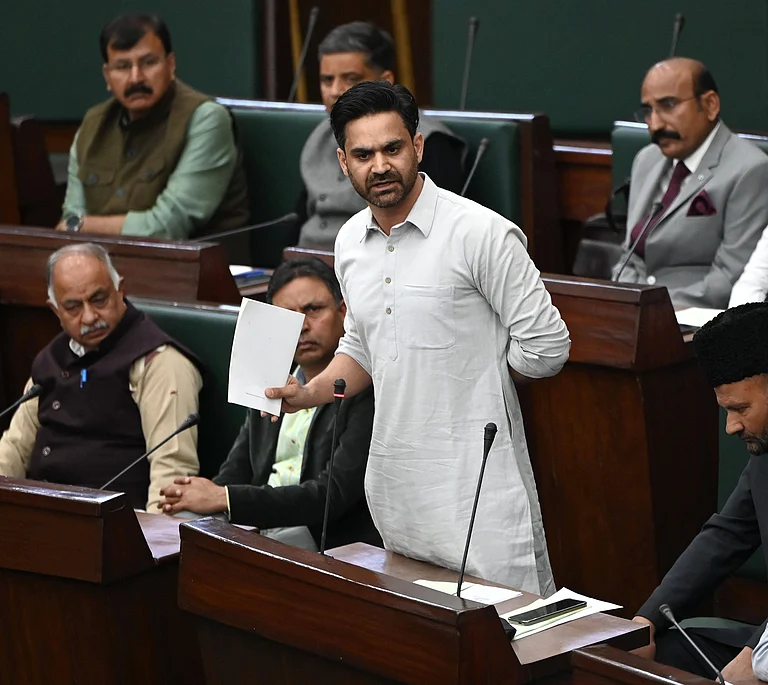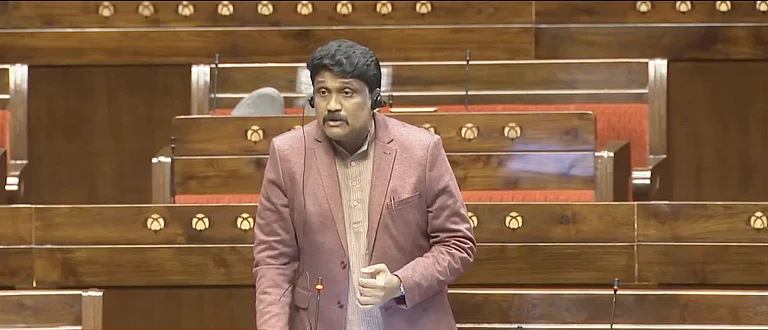The foamy clouds tap the green hills like big balloons. Petrichor from the light drizzle mixed with the fragrance of blooming flowers pervade all around. The endless green carpets of paddy fields, followed by a darker forest, extend up to the tops of the hills, where it gives way to the azure sky and the orange hue of the setting sun.
Sitting on a crimson carpet on the long veranda, Vandana plays the veena, unmindful of the beads of perspiration sparkling on her forehead in the setting sun. Her small, delicate fingers deftly touch the strings, the limpid blue eyes not wavering from them for a moment. The ochre ‘chunri’ flutters in the wind, blocking her vision of the strings. But she continues undeterred, with no break in the flow of music, and the wind, perhaps realising its folly, blows from the other end and drops it down on her lap.
Everybody—her parents, grandparents, uncles, aunts, children and the servants in the extended family—huddle around her on the carpet, enchanted by the melody.
Her youngest uncle reaches home from the city.
“Vandana is selected to perform at the musical concert tomorrow in the city. The programme will be telecast live,” he says.
The news ushers in a wave of excitement in the till-now mesmerised small congregation.
As Vandana receives the letter of invitation from her uncle, a faint smile appears on her face. Her mother knows that the bashful girl is trying her best to hide her glee.
“We have to start after dinner and reach the city at midnight so that Vandana can rest and be ready for it tomorrow. Now Vandana, pack up your things and get ready,” the uncle says.
Vandana runs to her room, leaving her excited family members. Her mother appears from behind when she is looking in the mirror. Turning around, she leaps at her, barely able to hide her excitement.
“I will perform at the concert!” She screams.
“Yes, my dear and many more such concerts will follow,” her mother assures.
They set out soon after dinner. Her Veena takes up most of the luggage space in the rear of the vehicle. As she turns around to glance at it from time to time, her father almost laughs at her.
“Your instrument is safe dear, and it can’t run away from you,” he said.
After the vehicle takes a bend around the hill, the sky with the sparkling stars gets covered with dark clouds. The thin air soon becomes moist and turns to gusts of wind, as if the hill had held them captive, and now chooses to unleash it at them.
Vandana looks ahead, the headlights cutting across the looming darkness on both sides, and the driver finds it difficult to keep the car on the road. The branches of the trees look like the trunks of some large elephants as sudden lightning illuminates the horizon time and again.
***
She wakes up and looks around. The white, green and red colours; the transparent liquid and glass tubes, the known yet unfamiliar smell in the room immediately tells her that she is in a hospital bed.
She hears the hushed voice of her father, talking to the doctor.
“Don’t worry. She will survive…she will be alright. There is only some minor injury on her head which will heal soon.”
“What about her hands doctor? They are in bandages.”
“Her hands are alright; the fingers are crushed though.”
“What ....! Will she be able to play the veena? She has a concert in the evening.” Her father blurts out.
“Ah...” The doctor clears his voice and continues, “We will see once the bandage is opened.”
***
She doesn’t play at the concert. She never does it again. Her head and the hand heals with time, but not the fingers. They remain still and straight.
In the initial months she would often look at the Veena atop the divan, her wistful eyes betraying the turmoil inside her—the longing to strum the strings and her gaze would involuntarily shift to her straight immobile finger, much like the straight strings of the veena, till one day the musical instrument is not to be found in her room.
As she moves towards her parent’s room to enquire about it, she hears them talking.
“It would only make things difficult for her,” her father says.
Vandana stops, retracing her steps.
“What’s the point of having it when you can’t play it? Why don’t you learn to sing instead, my dear? You have such a wonderful voice. ” Her mother reasons later.
But it is the strings that always draws her attention—the plastic rope used to dry the wet clothes on the roofs, its weight wilting it down to a curve notwithstanding, the small ones with which the children play hopscotch, the television cables that criss-cross the houses or even the leash of the dogs, especially when it barks and pulls it, making it straight.
“One day, surely you will play it again, my dear…”
“You never know when it will be…but time will come when you will play it again…”
She would listen to these words—from her parents, her other family members, friends, relatives.
‘Are they words of commiseration and sympathy? Or is there any shred of truth in it?’ She often wonders. And with time she stops thinking about it.
At times, she would look at the sky, the patterns that the gray, blue and dark clouds make. More often than not would find her veena there—the round, oval mass tapering onto the long and erect cylindrical form. Looking hard, she would also successfully locate the small, intricate yet invisible lines of the strings in the blue sky just above it.
After the searing heat of the summer, sporadic clouds appear in the sky for the first time that day. They hover around the sky during the day. But as night approaches, they transform into a dark, thick unitary mass.
She sits on the balcony throughout the day, witnessing the azure landscape being enveloped by a sepulchral darkness until her mother calls for dinner.
She is restless in her bed.
Tucked away somewhere in a remote corner of her memory, it comes riveting back, ready to sweep her with all its fury—the accident.
The sound of the thunder and the ceaseless tapering of rain echoes inside the room. Getting out of her bed, she goes to the window and looks out.
Outside, the spasms of lightning dazzle the horizons. The thin road passes through the now waterlogged paddy fields, takes some bends, and finally gets lost somewhere near the hills. She finds the newly installed large poles at equal intervals for electrification by its side.
And then ...she also sees something else, faintly discernible in the intermittent lightning.
“You never know when it will be…but time will come when you will play it again…”
Everybody has assured her that one day she will. Time will surely come.
The time has come.
Straining her eyes, she sees it there, atop the pole, bisecting the dark, expanding skylines.
The cable…the wires…the strings…
Yes, there…that’s where it is—her veena, inviting her, enticing her. Today, she will play it...
But it is so high up in the air! How can she reach it?
Her eyes glistening, she runs down the stairs and grasps the ladder resting on the wall. She opens the doors, its creaking sound making no audible impact in the thundering sounds outside, and sneaks out into the night.
A geologist by profession, Sanjaya Mishra also writes stories. His works have been published in numerous magazines and anthologies.





















